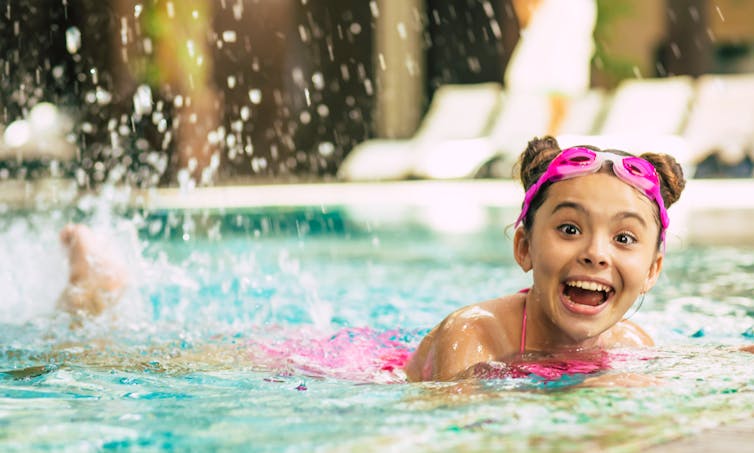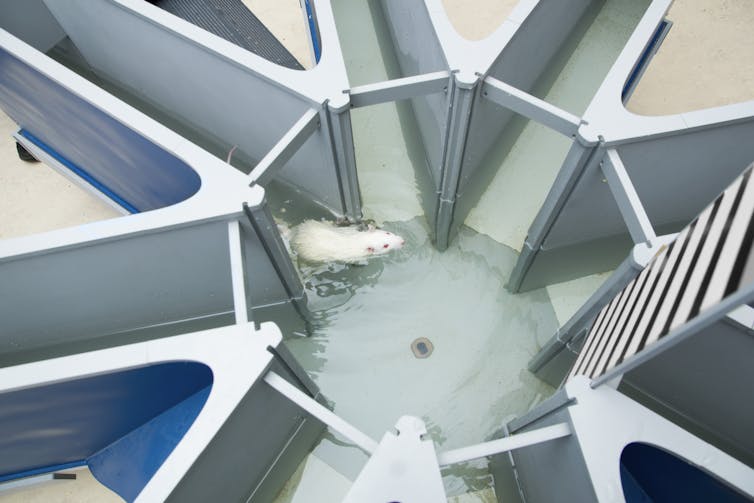Does The Liver Repair Itself From Drinking Too Much
It'southward no hush-hush that aerobic exercise can aid stave off some of the ravages of aging. Only a growing body of research suggests that swimming might provide a unique boost to brain health.
Regular swimming has been shown to improve retention, cerebral function, immune response and mood. Pond may also help repair damage from stress and forge new neural connections in the brain.
But scientists are notwithstanding trying to unravel how and why pond, in item, produces these encephalon-enhancing effects.
As a neurobiologist trained in brain physiology, a fitness enthusiast and a mom, I spend hours at the local puddle during the summer. It's not unusual to come across children gleefully splashing and swimming while their parents sunbathe at a distance – and I've been one of those parents observing from the poolside plenty of times. But if more than adults recognized the cognitive and mental wellness benefits of swimming, they might exist more than inclined to jump in the pool alongside their kids.
New and improved brain cells and connections
Until the 1960s, scientists believed that the number of neurons and synaptic connections in the human being brain were finite and that, in one case damaged, these brain cells could not be replaced. But that idea was debunked every bit researchers began to see ample prove for the nativity of neurons, or neurogenesis, in adult brains of humans and other animals.
At present, there is articulate evidence that aerobic exercise can contribute to neurogenesis and play a cardinal role in helping to reverse or repair impairment to neurons and their connections in both mammals and fish.
Research shows that one of the key means these changes occur in response to exercise is through increased levels of a protein called brain-derived neurotrophic factor. The neural plasticity, or power of the brain to change, that this protein stimulates has been shown to boost cognitive function, including learning and memory.

Studies in people have found a strong human relationship betwixt concentrations of brain-derived neurotrophic factor circulating in the brain and an increment in the size of the hippocampus, the brain region responsible for learning and memory. Increased levels of brain-derived neurotrophic cistron have likewise been shown to acuminate cognitive performance and to help reduce feet and depression. In dissimilarity, researchers have observed mood disorders in patients with lower concentrations of encephalon-derived neurotrophic factor.
Aerobic exercise also promotes the release of specific chemical messengers called neurotransmitters. 1 of these is serotonin, which – when present at increased levels – is known to reduce depression and anxiety and improve mood.
In studies in fish, scientists have observed changes in genes responsible for increasing brain-derived neurotrophic factor levels besides every bit enhanced development of the dendritic spines – protrusions on the dendrites, or elongated portions of nerve cells – after eight weeks of practice compared with controls. This complements studies in mammals where brain-derived neurotrophic factor is known to increase neuronal spine density. These changes have been shown to contribute to improved memory, mood and enhanced cognition in mammals. The greater spine density helps neurons build new connections and send more than signals to other nerve cells. With the repetition of signals, connections tin can go stronger.
Only what'south special about pond?
Researchers don't yet know what swimming's hush-hush sauce might be. Merely they're getting closer to agreement it.
Swimming has long been recognized for its cardiovascular benefits. Because pond involves all of the major muscle groups, the heart has to work hard, which increases blood period throughout the body. This leads to the cosmos of new blood vessels, a process chosen angiogenesis. The greater blood flow can also lead to a large release of endorphins – hormones that act equally a natural pain reducer throughout the body. This surge brings nigh the sense of euphoria that often follows exercise.
Near of the inquiry to empathize how pond affects the brain has been done in rats. Rats are a good lab model because of their genetic and anatomic similarity to humans.

In one written report in rats, swimming was shown to stimulate brain pathways that suppress inflammation in the hippocampus and inhibit apoptosis, or cell death. The written report also showed that swimming can aid support neuron survival and reduce the cerebral impacts of aging. Although researchers practice non yet have a manner to visualize apoptosis and neuronal survival in people, they do find similar cognitive outcomes.
One of the more enticing questions is how, specifically, swimming enhances short- and long-term memory. To pinpoint how long the beneficial furnishings may last, researchers trained rats to swim for 60 minutes daily for five days per week. The squad then tested the rats' memory by having them swim through a radial arm water maze containing vi arms, including ane with a hidden platform.
Rats got half dozen attempts to swim freely and observe the hidden platform. Later just seven days of swim training, researchers saw improvements in both brusk- and long-term memories, based on a reduction in the errors rats fabricated each 24-hour interval. The researchers suggested that this heave in cognitive role could provide a basis for using swimming every bit a way to repair learning and memory damage caused past neuropsychiatric diseases in humans.
Although the leap from studies in rats to humans is substantial, research in people is producing similar results that propose a clear cerebral do good from pond beyond all ages. For instance, in one study looking at the impact of swimming on mental acuity in the elderly, researchers concluded that swimmers had improved mental speed and attention compared with nonswimmers. Nevertheless, this study is express in its research design, since participants were not randomized and thus those who were swimmers prior to the study may accept had an unfair border.
Another study compared cognition between land-based athletes and swimmers in the young adult age range. While water immersion itself did not make a difference, the researchers constitute that 20 minutes of moderate-intensity breaststroke pond improved cognitive part in both groups.
Kids get a heave from pond besides
The encephalon-enhancing benefits from swimming appear to as well boost learning in children.
Another research group recently looked at the link between physical activity and how children learn new vocabulary words. Researchers taught children age 6-12 the names of unfamiliar objects. Then they tested their accuracy at recognizing those words after doing 3 activities: coloring (resting activity), pond (aerobic activity) and a CrossFit-similar exercise (anaerobic activeness) for three minutes.
[The Conversation's science, health and technology editors choice their favorite stories. Weekly on Wednesdays.]
They constitute that children'southward accurateness was much higher for words learned following swimming compared with coloring and CrossFit, which resulted in the same level of recall. This shows a articulate cognitive benefit from swimming versus anaerobic exercise, though the study does not compare swimming with other aerobic exercises. These findings imply that swimming for even brusque periods of time is highly beneficial to young, developing brains.
The details of the time or laps required, the style of swim and what cognitive adaptations and pathways are activated past swimming are notwithstanding being worked out. Just neuroscientists are getting much closer to putting all the clues together.
For centuries, people have been in search of a fountain of youth. Swimming just might exist the closest we tin become.
Source: https://theconversation.com/swimming-gives-your-brain-a-boost-but-scientists-dont-know-yet-why-its-better-than-other-aerobic-activities-164297
Posted by: taylorwilent.blogspot.com


0 Response to "Does The Liver Repair Itself From Drinking Too Much"
Post a Comment